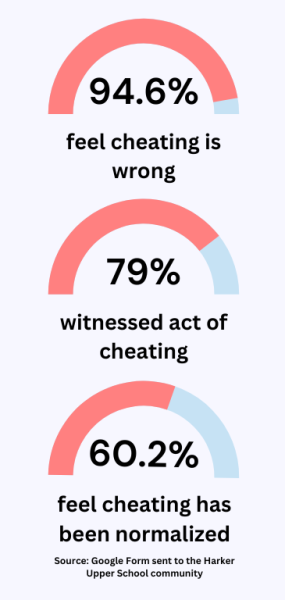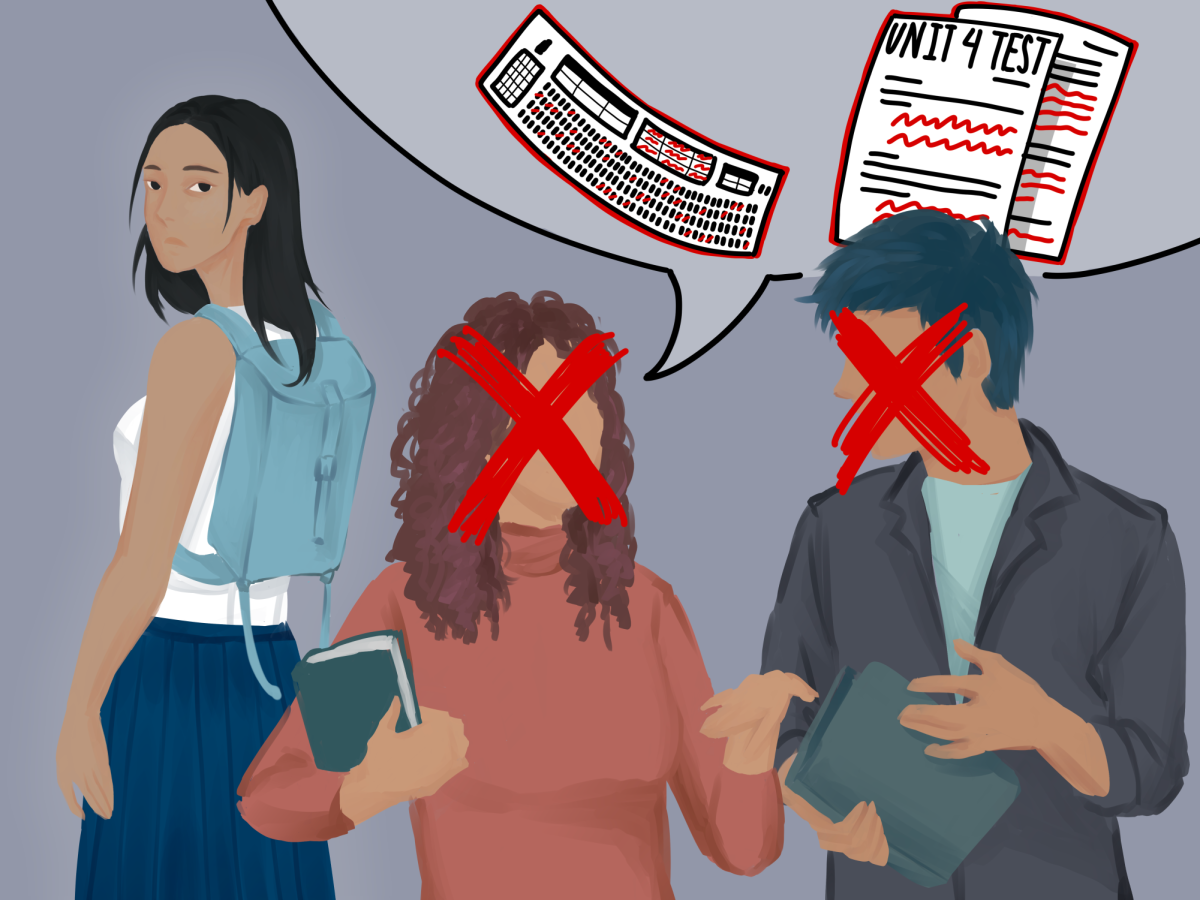A calculus test question for an English one, or an AP United States History multiple choice answer for the physics free response. Outside Dobbins or in the Main hallway, friends huddle together in groups, exchanging information on an imminent exam. Most students would not consider this cheating, despite clearly violating the honor code. Students may instead characterize such actions as simply helping a friend out, therefore rationalizing academic dishonesty and pressuring others to engage as well.
The high-pressure, academic culture at Harker, where grades overshadow the importance of genuine learning, exacerbates the problem of cheating. However, the pervasiveness of cheating within the student body does not align with the mission of our school. The academically rigorous environment at Harker aims to provide an environment of learning and exploration; cheating undermines that goal and nullifies Harker’s promise to foster academic curiosity.
Blatant actions like sharing test answers are clear violations, but many perceive ethical lines as blurred in areas such as peer editing and AI assistance. The boundaries of cheating have expanded in the digital age with the advent of AI technology such as ChatGPT. When teachers set clear boundaries and expectations, however, the responsibility lies with the student.
New technology has created an environment where cheating seems more viable and enticing, since students often perceive cheating as a shortcut to success. Students who opt to study hard instead of cheating may feel frustrated when they see those who cheat scoring higher and potentially reducing their score on a curve. Even on assignments that aren’t curved, honorable students may still feel demoralized if they witness a classmate cheat to achieve a higher grade. Thus, other students in those classes experience pressure to cheat, creating a vicious, perpetuating cycle.

To break the cycle, we must hold one another accountable for our actions. A primary concern is the reluctance to report cheating due to the stigma associated with being labeled a ‘snitch.’ On a Google Form shared with the Harker upper school community on Schoology on Dec. 4, 79.1% of 182 participants reported witnessing an act of cheating, 66% of whom have witnessed a friend cheating. Of these participants who saw someone cheat, 16% have reported an incident of cheating while 2% have reported a friend.
Administration should take practical steps to make reporting easier, ensuring that those who witness cheating can contribute to maintaining the integrity of the academic environment. Harsher penalties should be given to those caught cheating, and more rigorous test-taking procedures: stricter proctoring or more stringent security regarding technology could reduce the effectiveness of cheating.
Instead, it seems as if we have normalized cheating. Of the 185 responses to the Google Form, 60.4% feel cheating has been normalized at Harker, and 62.1% feel it is not a problem that can be resolved. Students discuss test content with their friends, violating the Harker Honor Code. Our comfort with discussing cheating indicates its prevalence and normalization in the student body, something no longer taboo to talk about.
With more reports of cheating, students will have to face consequences for their actions, cultivating external pressure against dishonesty. However, fear of the repercussions of cheating should not be the sole reason students avoid it. For a sustainable long-term solution, we should instead aim to change the intense culture at Harker, where cheating is no longer seen as a shortcut to better scores, but instead looked down upon. To begin building such a culture, students need to reframe their view of their education as a process, rather than the means to an end revolving around a number on their transcript.
Cheating harms the community in more ways than a student’s individual learning. The campus becomes a place of competition rather than learning, with a lack of emphasis on hard work, prioritizing those who cut corners in their work. The student body as a whole becomes more toxic, seeing one’s classmates as rivals rather than companions, and fuels an atmosphere of frustration and resentment.
As members of this academic community, it is our collective responsibility to contribute to an environment where honesty and integrity are upheld. Only with a unified effort from the whole community to reduce or eliminate cheating can the educational experience remain meaningful and transformative for each student.


















![“[Building nerf blasters] became this outlet of creativity for me that hasn't been matched by anything else. The process [of] making a build complete to your desire is such a painstakingly difficult process, but I've had to learn from [the skills needed from] soldering to proper painting. There's so many different options for everything, if you think about it, it exists. The best part is [that] if it doesn't exist, you can build it yourself," Ishaan Parate said.](https://harkeraquila.com/wp-content/uploads/2022/08/DSC_8149-900x604.jpg)




![“When I came into high school, I was ready to be a follower. But DECA was a game changer for me. It helped me overcome my fear of public speaking, and it's played such a major role in who I've become today. To be able to successfully lead a chapter of 150 students, an officer team and be one of the upperclassmen I once really admired is something I'm [really] proud of,” Anvitha Tummala ('21) said.](https://harkeraquila.com/wp-content/uploads/2021/07/Screen-Shot-2021-07-25-at-9.50.05-AM-900x594.png)







![“I think getting up in the morning and having a sense of purpose [is exciting]. I think without a certain amount of drive, life is kind of obsolete and mundane, and I think having that every single day is what makes each day unique and kind of makes life exciting,” Neymika Jain (12) said.](https://harkeraquila.com/wp-content/uploads/2017/06/Screen-Shot-2017-06-03-at-4.54.16-PM.png)








![“My slogan is ‘slow feet, don’t eat, and I’m hungry.’ You need to run fast to get where you are–you aren't going to get those championships if you aren't fast,” Angel Cervantes (12) said. “I want to do well in school on my tests and in track and win championships for my team. I live by that, [and] I can do that anywhere: in the classroom or on the field.”](https://harkeraquila.com/wp-content/uploads/2018/06/DSC5146-900x601.jpg)
![“[Volleyball has] taught me how to fall correctly, and another thing it taught is that you don’t have to be the best at something to be good at it. If you just hit the ball in a smart way, then it still scores points and you’re good at it. You could be a background player and still make a much bigger impact on the team than you would think,” Anya Gert (’20) said.](https://harkeraquila.com/wp-content/uploads/2020/06/AnnaGert_JinTuan_HoHPhotoEdited-600x900.jpeg)

![“I'm not nearly there yet, but [my confidence has] definitely been getting better since I was pretty shy and timid coming into Harker my freshman year. I know that there's a lot of people that are really confident in what they do, and I really admire them. Everyone's so driven and that has really pushed me to kind of try to find my own place in high school and be more confident,” Alyssa Huang (’20) said.](https://harkeraquila.com/wp-content/uploads/2020/06/AlyssaHuang_EmilyChen_HoHPhoto-900x749.jpeg)





Will Gonsior • Feb 9, 2024 at 4:48 pm
Everyone can benefit from an article like thi… wait does that say Dobbins? Like JK ALL DAY???
sorry back on topic this is a great article. Makes me think twice about letting a friend copy my notes earlier today — not something I thought twice about, but I suppose I should have.